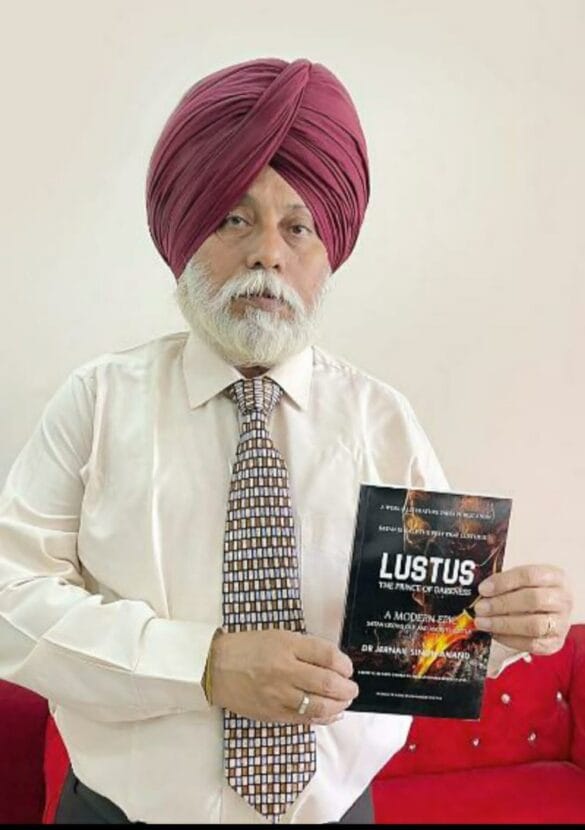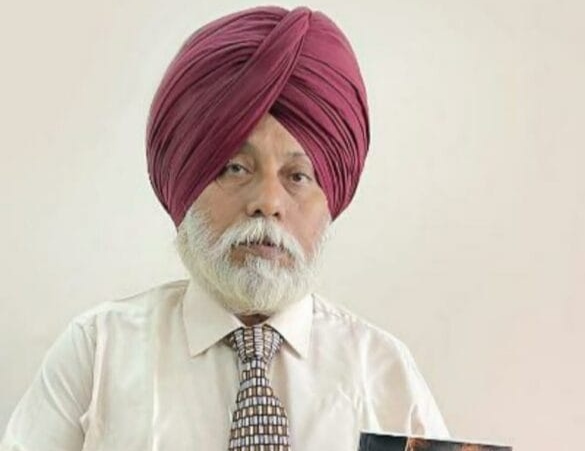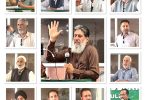GnkEnglishNewsDesk
LITERATURE IS MEANT TO RESIST THE FALL IN PUBLIC MORALITY AND UPHOLD STANDARDS OF LIVING AND THOUGHT: DR JERNAIL SINGH ANAND
Interview
LITERATURE IS MEANT TO RESIST THE FALL IN PUBLIC MORALITY AND UPHOLD STANDARDS OF LIVING AND THOUGHT: DR JERNAIL SINGH ANAND
Poetry is not about singing paeans to a beautiful belle, or praising the clouds or the rainbow. Literature is also meant to resist the fall in public morality and uphold standards of living and thought
written by WebDesk February 23, 2023.
The greatest author of our times, Dr. Jernail Singh Anand was interviewed by Dr. Shiv Sethi for the Heaven Mail.

Dr. Anand has authored more than 150 books. Apart from this, he has innovated the theory of Bio-text in critical theory. Dr. Anand is the only author after Rabindra Nath Tagore, to have been conferred Honorary Membership of the Association of Serbian Writers, Belgrade.
His Mahakaal Trilogy which features the great corporate demon, Lustus, and presages a new brave world under Queen Ultronia, is going to hit OTT as a web-series.
Dr. Anand, your contemporary writer Dr. Maja Herman Sekulic compares you to Daniel Defoe while commenting on your work as a great satirist of our times. What impels you to write? What is Poetic Impulse? And why you have not digressed into Prose or fiction?
You are right. There are internal pressures. The impulse comes from inside. And then, it keeps disturbing you until you get rid of it, in the form of a poem. I feel relieved, and happy, after a poem is born. The poetic impulse has no timing as such. It can visit you anytime. It is a fleeting moment and has to be captured in its nudity. Once the impulse passes off, it may not return to you for ever. So far as prose and fiction are concerned, I can say my essential genius is poetic. Poetry comes naturally to me, as Keats said, as leaves come to a tree. I have authored three novels. The Broken Narrative, which was translated into Persian, was my most successful semi-autobiographical novel. The others are The Trespassers and The Wolves of Malwadi. So far as prose is concerned, I have written quite a few books such as The Monster Within, Bliss: The Ultimate Magic, I Belong to You, Hard Talk [political theory] and they have clicked with the readers. I sometimes believe even poetry is fiction, rather highly charged fiction.
Which is your most ambitious work? Do you think it is written for the intellectual elite or for the reading public and how you connect the two worlds?
I have authored around 9 epics, which are my most challenging work, starting with Geet: The Unsung Song of Eternity, The Satanic Empire, The Plague: the Metaphor is Dead, The Mahabharata:The War of Words, The Master: The Prophet Returns, The Ganterbury Tales, followed by the Mahakaal Trilogy, Lustus: The Prince of Darkness, The Dominion of the Netherworld and The Ultronic Age: The Celestial Reign. I can say Lustus, which represents the Corporate Evil of our times, is the most charismatic work, which, in times to come, might pose a grave challenge to Satan. Generally, a writer addresses the intellectual elite for literary evaluation of his work. I strongly believe that all literature is aimed at human wellbeing. But if ordinary people with an average IQ cannot understand the work, half the job remains unaccomplished. The books are not meant for library shelves. They must flow to the people. I wish to ask: How many fishermen have read the Hemingway’s award-winning novel: The Old Man and the Sea. I see only intellectuals debating these novels in seminars, and research scholars writing dissertations, which do not access the mass consciousness, thereby creating a chasm between the writing elite, the debating few and the unconcerned, untouched, unaware millions. No wonder, literature has never become a mass movement, like politics and social service.
What is your take on the language of Poetry? What is the moral imperative in a work of art?
The words that a poet chooses mostly come to him in a state of passion, and he has not much control over them. Yes, after downloading it, he may make alterations. Conscious writing of poetry, like prose, at a definite time every day, is asking too much from the Muse. Poetry, unlike prose, does not say anything, it only suggests, much less didacts. It is a passionate rendering of a moment’s feeling. Call it escape, or release if you wish. Poetry grips you like a passion, and does not leave you until you have shared your vision with the readers. Every work of art is aimed at imparting pleasure to mankind, but this pleasure cannot be unmixed. Art, to be sublime, has to subserve the greater cause of universal wellbeing. Literature states the reality in such a way that even the tragic ends up elevating human consciousness. Art focuses on the beauty in human life, appeals to the aesthetic sense of humanity, without surrendering its moralistic commitments.
What is the idea behind the University of Ethics? Do you feel you have fulfilled your life mission?
I believe that only literature can save humanity from deterioration and self-destruction. But it is a pity, the modern universities try to peripherise literature, which is taught only for research purposes. Even research is entirely an academic pursuit, mostly unrelated to life. I also wonder at the increasing interest of the academia in the study of the past. Study of Literature in its Creative Form, rather than the research modules, must take the front seat. The University of Ethics aims at doing what education has failed to do: to connect the students with the affirmative aspects of living and being in the universe. We have to realize our cosmicity, and this job will be performed by the Univ. of Ethics. Yes, I feel I have expressed myself in my poetry and the Univ. of Ethics is also an act of my commitment with life. And I can say: I am happy and satisfied.
How do you react to the present state of literature? And how do you think your work has been rewarded?
If we go by the face-book, there is a great literary ferment. Thousands of portals are organizing as many contests and sending certificates and awards to each other. Too much of everything is bad. It seems the focus is less on creativity, and more on exhibition. One strange development is the IAS officers becoming Heads of Literary Organizations. No doubt they are good managers, but it does not make them good writers too. They are setting a narrative which impinges on the spirit of literature. Poetry is not about singing paeans to a beautiful belle, or praising the clouds or the rainbow. Literature is also meant to resist the fall in public morality and uphold standards of living and thought. I wonder it is possible if the administration is sitting on the head of a literary organization. About the second part, I don’t think people who think free and write not to please any dispensation should expect any state awards. Their only reward is the love of the people for whom they write.







